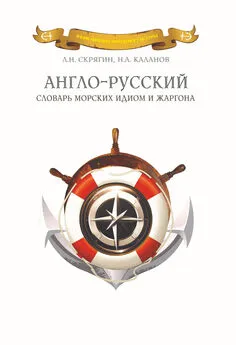Adam Makkai - Словарь американских идиом: 8000 единиц
- Название:Словарь американских идиом: 8000 единиц
- Автор:
- Жанр:
- Издательство:неизвестно
- Год:неизвестен
- ISBN:нет данных
- Рейтинг:
- Избранное:Добавить в избранное
-
Отзывы:
-
Ваша оценка:
Adam Makkai - Словарь американских идиом: 8000 единиц краткое содержание
Это обновленное и дополненное издание, содержащее более 8000 идиоматических
слов и выражений, причем каждое из которых снабжено грамматическим объяснением
и практическим примером. Словарь содержит лексемные идиомы, фразеологические
единицы и поговорки, имеющие особенное значение. В нем приведены наиболее
употребительные выражения только американского английского языка. Этот словарь — идеальное пособие для студентов, часто разъезжающих бизнесменов и просто
путешественников.
Словарь американских идиом: 8000 единиц - читать онлайн бесплатно полную версию (весь текст целиком)
Интервал:
Закладка:
[lay rubber]or [lay a patch] {v. phr.} , {slang} To take off in a car or a motorcycle so fast that the tires (made of rubber) leave a mark on the pavement. •/ Look at those crazy drag racers; they laid rubber in front of my house. /
[lay the blame at one’s door] {v. phr.} To say that another person or group is responsible for one’s own failure. •/ The angry coach laid the blame at the door of the players when our college lost the basketball game. /
[lay the fault at one’s door]See: LAY THE BLAME AT ONE’S DOOR.
[lay their heads together]See: PUT THEIR HEADS TOGETHER.
[lay to] {v.} 1. To give the blame or credit to; to name as cause. •/ He was unpopular and when he made money, it was laid to his dishonesty, but when he lost money, it was laid to his stupidity. / Compare: LAY AT ONE’S DOOR. 2. To hold a ship or boat still against the wind. •/ The pirates decided to lay to that night and go ashore in the morning. / Compare: LIE TO. 3. To exert oneself; to work hard. •/ He picked up a shovel and laid to with the rest of the gang. /
[lay to heart]See: TAKE TO HEART.
[lay to rest] {v. phr.} , {informal} 1. To put a dead person into a grave or tomb; bury. •/ President Kennedy was laid to rest in Arlington National Cemetery. / 2. To get rid of; put away permanently; stop. •/ The Scoutmaster’s fears that Tom had drowned were laid to rest when Tom came back and said he had gone for a boat ride. / •/ The rumor that the principal had accepted another job was laid to rest when he said it wasn’t true. /
[lay up] {v.} 1. To collect a supply of; save for future, use; store. •/ Bees lay up honey for the winter. / 2. To keep in the house or in bed because of sickness or injury; disable. •/ Jack was laid up with a twisted knee and couldn’t play in the final game. / 3. To take out of active service; put in a boat dock or a garage. •/ Bill had to lay up his boat when school started. / •/ If you lay up a car for the winter, you should take out the battery. /
[lay waste] {v. phr.} , {literary} To cause wide and great damage to; destroy and leave in ruins; wreck. •/ Enemy soldiers laid waste the land. /
[lead]See: ALL ROADS LEAD TO ROME, BLIND LEADING THE BLIND.
[lead]See: GET THE LEAD OUT OF ONE’S PANTS.
[lead a dog’s life] {v. phr.} , {informal} To live a hard life, work hard, and be treated unkindly. •/ A new college student of long ago led a dog’s life. /
[lead a merry chase] {v. phr.} To delay or escape capture by (someone) skillfully; make (a pursuer) work hard. •/ The deer led the hunter a merry chase. / •/ Valerie is leading her boyfriend a merry chase. /
[lead by the nose] {v. phr.} , {informal} To have full control of; make or persuade (someone) to do anything whatever. •/ Many people are easily influenced and a smart politician can lead them by the nose. / •/ Don’t let anyone lead you by the nose; use your own judgment and do the right thing. /
[leader]See: MAJORITY LEADER, MINORITY LEADER.
[lead-footed]See: HEAVY-FOOTED.
[leading light] {n. phr.} A prominent person in a community, company, or group. •/ Alan is the leading light of our discussion group on music. /
[lead off] {v.} To begin; start; open. •/ Richardson led off the inning with a double. / •/ We always let Henry lead off. / •/ Mr. Jones led off with the jack of diamonds. / •/ When the teacher asked if the film helped them to understand, Phil led off by saying that he learned a lot from it. /
[lead on] {v. phr.} To encourage you to believe something untrue or mistaken. •/ Tom led us on to believe that he was a world traveler, but we found out that he had never been outside our state. / •/ We were led on to think that Jeanne and Jim were engaged to be married. /
[lead one a merry dance] {v. phr.} To cause someone unusual discomfort or expense; tire someone by causing one to overdo. •/ With her personal extravagances and constant social activities that cost a fortune, Carol led her husband a merry dance. /
[lead the way] {v. phr.} To go before and show how to go somewhere; guide. •/ The boys need someone to lead the way on their hike. / •/ The men hired an Indian to lead the way to the Pueblo ruins. / •/ That school led the way in finding methods to teach reading. /
[lead to] {v. phr.} To result in. •/ Such a heavy arms race can only lead to war. /
[leaf]See: TURN OVER A NEW LEAF.
[leaf through] {v. phr.} To scan or glance through a book or other reading matter. •/ I only had time to leaf through the program before the concert started. /
[league]See: IN LEAGUE WITH, IVY LEAGUE.
[leaguer]See: TEXAS LEAGUER.
[leak out] {v. phr.} To become known; escape. •/ The famous beauty queen tried to keep her marriage a secret, but news of it soon leaked out. /
[leak to] {v. phr.} To purposely let a secret be known, as if conveying it in the strictest confidence. •/ The movie star’s secret divorce was leaked to the tabloids by her housekeeper. /
[lean on] {v. phr.} , {slang} , {informal} To pressure (someone) by blackmailing, threats, physical violence, or the withholding of some favor in order to make the person comply with a wish or request. •/ I would gladly do what you ask if you only stopped leaning on me so hard! /
[lean over backward]See: BEND OVER BACKWARD.
[lean-to] {n.} 1. A shed for tools, such as spades, hoes, etc., attached to the wall of a house, •/ Joe looked for the garden hose in the lean-to. / 2. A small cabin in the country. •/ They spend their weekends in their modest lean-to in Wisconsin. /
[leap]See: BY LEAPS AND BOUNDS.
[leap year] {n.} Every fourth year during which the month of February contains 29 rather than 28 days. •/ During a leap year one must wait a day longer for one’s February pay check. /
[learn]See: LIVE AND LEARN.
[learn by heart]See: BY HEART.
[learn by rote] {v. phr.} To blindly memorize what was taught without thinking about it. •/ If you learn a subject by rote, it will be difficult to say anything original about it. /
[learn one’s way around]See: KNOW ONE’S WAY AROUND.
[learn the hard way]See: HARD WAY.
[learn the ropes]See: THE ROPES.
[least]See: AT LEAST, IN THE LEAST, LAST BUT NOT LEAST, LINE OF LEAST RESISTANCE.
[leatherneck] {n.} , {slang} , {informal} A member of the United States Marine Corps. •/ I didn’t know your son Joe became a leatherneck. /
[leave]See: SHORE LEAVE, TAKE IT OR LEAVE IT, TAKE LEAVE OF, TAKE ONE’S LEAVE.
[leave a bad taste in one’s mouth] {v. phr.} To feel a bad impression; make you feel disgusted. •/ Seeing a man beat his horse leaves a bad taste in your mouth. / •/ His rudeness to the teacher left a bad taste in my mouth. /
[leave alone]See: LET ALONE.
[leave at the altar] {v. phr.} 1. To decide not to marry someone in the last minute; jilt. •/ Ed left poor Susan at the altar. / 2. To overlook and skip for promotion; not fulfill deserved expectation. •/ Once again I didn’t get my promotion and was left at the altar. /
[leave behind] {v. phr.} 1. Abandon. •/ Refugees on the run must sometimes leave old and sick people behind. / 2. To forget; go away without. •/ We had reached our car when we noticed that we had left our keys behind. /
[leave flat] {v. phr.} , {informal} To quit or leave suddenly without warning when wanted or needed; desert; forsake; abandon. •/ Sam found that being a member of the trail-clearing group was a lot of hard work, so he left them flat. / •/ My car ran out of gas and left me flat, ten miles from town. / Compare: LEAVE IN THE LURCH, WALK OUT(2).
[leave hanging]or [leave hanging in the air] {v. phr.} To leave undecided or unsettled. •/ Because the committee could not decide on a time and place, the matter of the spring dance was left hanging. / •/ Ted’s mother didn’t know what to do about the broken window, so his punishment was left hanging in the air until his father came home. / Compare: UP IN THE AIR.
[leave high and dry]See: HIGH AND DRY.
[leave holding the bag]or [leave holding the sack] {v. phr.} , {informal} 1. To cause (someone) not to have something needed; leave without anything, •/ In the rush for seats, Joe was left holding the bag. / 2. To force (someone) to take the whole responsibility or blame for something that others should share. •/ When the ball hit the glass, the team scattered and left George holding the bag. / •/ After the party, the other girls on the clean-up committee went away with their dates, and left Mary holding the bag. /
[leave in the lurch] {v. phr.} To desert or leave alone in trouble; refuse to help or support. •/ The town bully caught Eddie, and Tom left him in the lurch. / •/ Bill quit his job, leaving his boss in the lurch. / Compare: LEAVE FLAT, HIGH AND DRY(2), WALK OUT(2).
[leave it at that] {v. phr.} To avoid further and more acrimonious disagreement; not argue or discuss any further. •/ Our opinion on health care is obviously different, so let’s just leave it at that. /
[leave no stone unturned] {v. phr.} To try in every way; miss no chance; do everything possible. — Usually used in the negative. •/ The police will leave no stone unturned in their search for the bank robbers. / Compare: ALL OUT, BEND HEAVEN AND EARTH, FINE-TOOTH COMB.
[leave off] {v.} To come or put to an end; stop. •/ There is a high fence where the school yard leaves off and the woods begin. / •/ Don told the boys to leave off teasing his little brother. / •/ Marion put a marker in her book so that she would know where she left off. / Contrast: TAKE UP.
[leave one’s mark] {v. phr.} To leave an impression upon; influence someone. •/ Tolstoy never won the Nobel Prize, but he left his mark on world literature. / See: MAKE ONE’S MARK.
[leave open] {v. phr.} To remain temporarily unsettled; subject to further discussion. •/ Brad said that the question of health insurance would be left open until some future date. /
Читать дальшеИнтервал:
Закладка:







